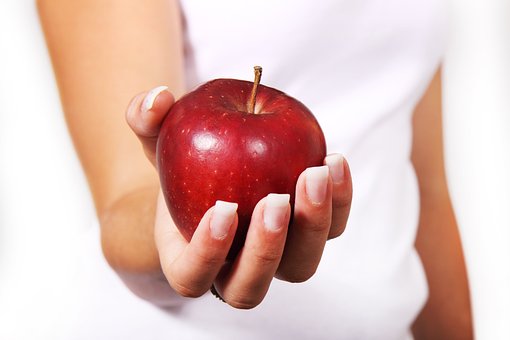Calories are important so that you don’t eat too much and gain weight. Check how many calories are in an apple by reading this article.
Apples are rich in dietary fiber, vitamin C, and potassium. In addition, each half-cup portion has 4 grams of protein, which is almost the same amount as in half a cup of yogurt. This makes it an excellent after-work snack if you’re needing something sweet and crunchy.
Did you know a medium apple has just 80 calories? This is a terrific method to obtain your daily dosage of vitamin C, which prevents anemia and aids with iron absorption. Apples also lower blood pressure, enhance the immune system, and improve one’s mood.
And the highlight? Apples are versatile !You may consume them raw, prepare them as pies and you can even make caramelized apples!
Table of Contents
All about an Apple

Apple is the most commonly grown species in the genus Malus and is widely cultivated as a fruit tree. The apple tree is thought to have originated in Central Asia, where its wild ancestor, Malus sieversii, can still be found. There are a lot of people who are curious about how many calories are in an apple.
Apples are popular due to the numerous ways in which they can be consumed, as well as their convenience and durability. Apples are popular in pastries, cakes, tarts, and pies because they can be processed into sauce, slices, or juice.
Health Benefits of apples
Apples are nutritious so how many calories are in an apple ?
Apples are nutrient-dense fruits, which means they provide a lot of nutrients per serving.
For a 2,000-calorie diet, the current Dietary Guidelines for Americans recommend 2 cups of fruit per day, emphasising whole fruits like apples. Below, you can find how many calories are in an apple and other nutrients.
The nutrients in one medium 7-ounce (200-gram) apple are as follows:
how many calories are in an apple :
- 104 calories
- Carbohydrates: 28 g
- Fiber: 5 g
- 10% of the Daily Value for Vitamin C (DV)
- Copper accounts for 6% of the DV
- 5% of the DV for potassium
- 4% of the DV for vitamin K
- The same serving also contains 2-5% of the daily value (DV) for vitamins E, B1, and B6.
- Vitamin E
Apples are also high in polyphenols, which are a type of antioxidant. Antioxidants shield your cells from free radicals, which are harmful molecules that contribute to the development of chronic diseases such as heart disease and cancer.
While these plant compounds aren’t listed on nutrition labels, they’re most likely responsible for many apples’ health benefits. To get the most out of apples, keep the skin on because it contains half of the fiber and the majority of the polyphenols.
May aid in weight loss

Apples are high in fiber and water, both of which make them filling. A growing sense of fullness can help you lose weight by controlling your appetite. This may cause you to reduce your energy intake.
Consuming whole apples increased feelings of fullness for up to 4 hours longer than consuming equal amounts of apple purée or juice, according to one study. This occurs because whole apples slow down gastric emptying or the rate at which your stomach empties its contents.
According to research, apple consumption may also significantly reduce Body Mass Index (BMI), a weight-related risk factor for heart disease.
Interestingly, apple polyphenols may have anti-obesity properties as well.
It is beneficial to your heart
Apples are associated with a lower risk of heart disease. One possible explanation is that they contain soluble fiber. This type of fiber can aid in the reduction of blood cholesterol levels.
Another reason could be that they provide polyphenols. Some of these, such as the flavonoid epicatechin, have been shown to lower blood pressure.
Flavonoids have also been linked to a lower risk of stroke in studies. Furthermore, flavonoids can help prevent heart disease by lowering blood pressure, decreasing LDL cholesterol oxidation, and decreasing atherosclerosis, or the buildup of plaque in your arteries.
Another study found that eating white-fleshed fruits and vegetables, such as apples and pears, reduced the risk of stroke. The risk of stroke is reduced by 9% for every 1/5 cup (25 grams) of apple slices consumed daily.
Could improve gut health
This means that it feeds your gut microbiota or good bacteria in your gut. Your gut microbiota plays an important role in your overall well-being because it involves many functions related to health and disease. A healthy gut is frequently necessary for good health.
Lower diabetes risk

Eating apples may also lower your risk of developing type 2 diabetes. A review of studies found that eating apples and pears reduced the risk of type 2 diabetes by 18%. Just one serving per week could lower the risk by 3%.
How many calories are in an apple?
A medium apple has 95 calories per serving, according to the USDA. However, the fruit has a variety of other nutritional benefits. Here’s how a medium apple compares with its skin:
- 95 calories
- Fat: 0 g
- 25 g carbohydrate
- 19g sugars
- 4 g dietary fiber
- 0 g protein
If the sugar content makes you pause, consider this: The sugar content of an apple is not the same as the 21 grams of sugar in a chocolate bar.
Fiber is found in fruits and vegetables because it is nature’s way of controlling blood sugar levels. Fiber helps slow digestion, preventing blood sugar spikes caused by an equal amount of sugar in candy.
Additional Information about apple’s nutrition
Just one medium apple contains 14% of your daily value of vitamin A and 11% of your daily value of vitamin C. That is ab additional information on how many calories are in an apple. Antioxidants such as vitamins C and A in apples help prevent excessive free radical damage. Stopping these free radicals can help you live longer and live healthier.
FAQs
How many apples can you consume a day?
Eating apples, which are high in fiber and compounds known as polyphenols, can help reduce “bad cholesterol,” according to research conducted by scientists. According to research, lowering cholesterol and protecting against heart disease can be accomplished by eating two apples daily.
What is the best time to eat an apple?
Consume it during the morning. But, it is not a good idea to consume an apple when your stomach is empty. It may result in bloating and constipation. In a nutshell, the morning hours, specifically, after breakfast, are the ideal time to consume an apple because of its high concentration of nutrients.
Are apples good for weight loss?
Yes, apples are beneficial for weight loss due to their high fiber and water content, which help you feel full and keep hydrated. In addition, they contain pectin, a soluble fiber that helps to delay digestion so that you feel fuller for longer. Apples are likewise low in calories, so they will not contribute to your daily total.
Conclusion
Apples are a great way to get fiber and vitamin C in your diet. They’re also packed with antioxidants, which can help protect against cancer. But if you want to ensure you’re getting the most out of your apple, you need to know how many calories there are in an apple.
There you have it, for the question, how many calories are in an apple. A medium-sized apple contains about 95 calories. However, if you’re trying to lose or maintain your current weight, eating just one or two apples each day instead of three or four is best. You can also cut down on calories by choosing smaller apples and eating only the skin.

